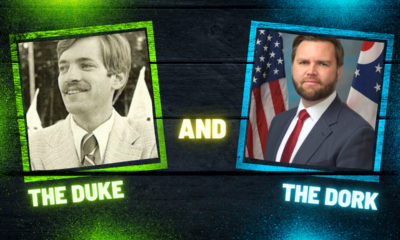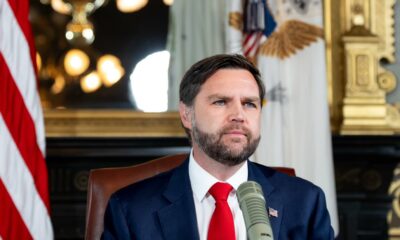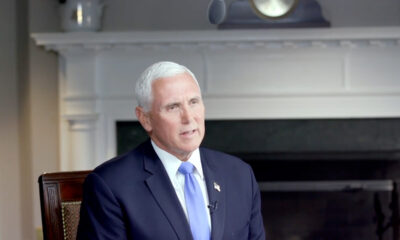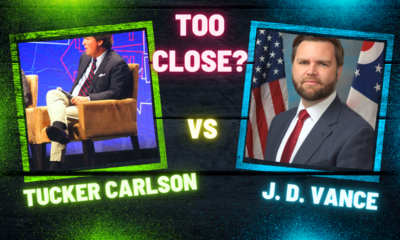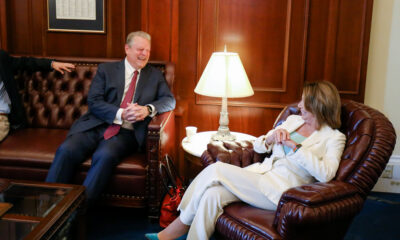Executive
The Vice President Has an X Habit
Vice-President J. D. Vance has a heavy habit of posting to X, because he grew up with social media and knows how to use it.
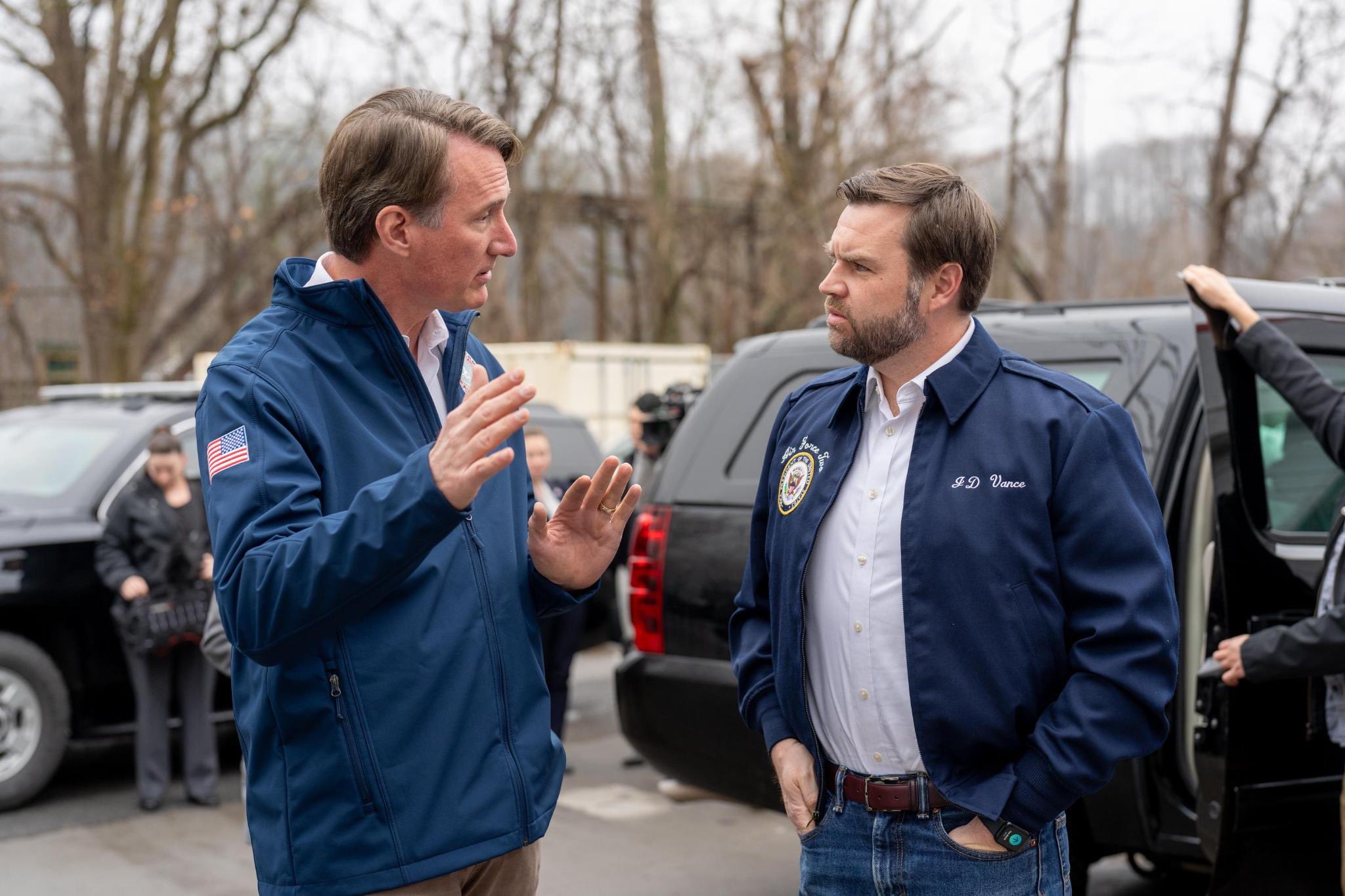
Before his second cup of coffee, Jonathan Liedl discovered he was going viral. The academic did not understand. His niche Catholic conversations had attracted a small following over the years, but most days, his corner of the Internet remained a quiet one. Wading through the sudden flood of notifications, he found his answer: “Oh, the vice president of the United States just replied to my tweet.”
Vance surprises an academic
“That is an absurd sentence,” he said reliving the experience from his home in St. Paul, Minnesota. “Five years ago, it would have made no sense at all.”
The day before, Liedl, an editor for the National Catholic Register, had politely questioned how a populist administration could advocate for deregulating artificial intelligence if that meant risking the jobs of American workers. Across the Atlantic Ocean the next day, J.D. Vance perused the Internet in Paris, France, came across the good-faith critique while in between his diplomatic duties, and attempted to harmonize populism with the promise of advancing technology.
Vance said he would write more later.
I’ll try to write something to address this in detail. But I think this civil war is overstated (though yes there are some real divergences between the populists and the techies). But briefly:
In general: I dislike substituting American labor for cheap labor. My views on…— JD Vance (@JDVance) February 12, 2025
Liedl, who isn’t in the habit of handing out writing assignments to anyone, much less to someone a heartbeat away from the presidency, read and then reread the response, double-checking to see that its author was real, and wondered, “How did he even see my post?”
The answer is simple. The vice president has a Twitter (X) habit.
Examples of the X habit
He tweeted from his new home about moving his family into the vice-presidential mansion. He retweeted a video Speaker Mike Johnson took of him the moment he first walked into the Oval Office. He tweeted about breaking a tie to confirm Defense Secretary Pete Hegseth, joking while en route to Capitol Hill from his motorcade, “I thought I was done voting in the Senate.” He tweeted his interpretation of the Catholic teaching of ordo amoris and even earned a rare rebuke from Pope Francis.
He tweeted, and tweeted, and tweeted, pressing send no less than 74 times in his first 30 days in office. Of course, those are rookie numbers compared to his boss, who reshaped the presidency with his tens-of-thousands of social media posts.. Trump supporters have been hooked for a decade. They like their politicians unfiltered and expect the same kind of direct-to-consumer stream of consciousness from the president’s new Hillbilly Apprentice. There is no learning curve here for the vice president though. When it comes to social media, said Alex Bruesewitz, a top Trump advisor, the two men are “cut from the same cloth.”
Perhaps, but there are significant differences. The vice president seldom unleashes caps lock like Trump, and second lady Usha Vance recently encouraged him to be nicer on social media. “I don’t know that I’ll take that advice,” he joked onstage at CPAC last week, before adding moments later that in politics, “The best advice she gave me is don’t let them filter you.”
Vance grew up with social media
Unlike his predecessors, Vance did not adopt social media so much as he grew up with it. He joined the U.S. Marine Corps the same year MySpace launched, attended the Ohio State University during the heyday of Facebook, and joined Twitter in June of 2013 just one month after graduating from Yale Law School. The elder millennial is now the first of his generation to serve as vice president, and Vance, 40, recognizes that the medium itself is the message.
Online sleuths speculate that Vance must have a burner account. How else could he consume so much news and parachute into so many conversations? A spokeswoman told RealClearPolitics that the vice president uses only one username: his official one. The dad jokes and the diatribes about everything from theology to political theory are his own, his aides insist. Communications staff don’t write his posts. He does.
The strategy, if there is one, is just to continue being a regular guy – in other words, to be the exact opposite of what Minnesota Gov. Tim Waltz tried to label him as during the campaign: “Weird.”
Unvarnished thoughts
“J.D. is giving you his unvarnished thoughts on Twitter,” explained a longtime friend. “If he sees something interesting, political or non-political, he might reply.” One person close to the vice president likened it to being “an anti-influencer, influencer.” Vance may be authentic, but he isn’t exactly normal because normal people don’t write memoirs that Academy-Award winning director Ron Howard turns into biopics or ascend to the vice presidency at the end of their 30s.
“He’s such a unique figure, not just in the Republican Party, but really in American politics for the past generation,” said Oren Cass, conservative economist and longtime friend of the new vice president. “He did not get his start in politics or move up through the trajectory of one seeking elected office.”
Before Vance even ran for Senate, he served as a sort of vanguard for the populist right, a codification of Trumpism defined by a rejection of libertarian economics and neoconservative foreign policy. Cass described the VP as “a founding member” of the ascendant intellectual movement, recalling late-night online debates. “Vance brings a depth of understanding and eagerness to fight and win on the issues,” he said, “that goes far beyond what you get from a typical politician.”
The new Vance, same as the old Vance
People close to Vance since he entered politics insist that the old J.D. is the same as the new J.D. They say the vice president sounds the same today as he did when arguing about tariffs in group chats, not like other politicians but like a regular dad who entered the discussion as a public intellectual.
He recently shared a story before church one Sunday morning to lightheartedly illustrate “the difference between the two genders.” When the 2006 Rascal Flats song “Life Is a Highway” came on over the radio in the motorcade, his four-year-old son shouted, “This is a great fighting song!” His three-year-old daughter interrupted, “No this is a great dancing song!” The post attracted millions of views during the service.
After mass, another tweet triggered criticism of authoritarianism.
“If a judge tried to tell a general how to conduct a military operation, that would be illegal,” Vance wrote a few hours later in response to the flurry of court orders against the administration. “If a judge tried to command the attorney general in how to use her discretion as a prosecutor, that’s also illegal. Judges aren’t allowed to control the executive’s legitimate power.”
Sen. Adam Schiff, a California Democrat, said that such rhetoric puts the country on “a dangerous path to lawlessness.” Former Republican Rep. Liz Cheney accused Vance of trying to “rage-quit the Republic because you are losing.” The vice president didn’t respond that Sunday. He tweeted about Super Bowl commercials instead.
Consultants have the willies
“Anytime a politician writes their own tweets it can give their consultants heartburn,” said Ryan Girdusky, who first met Vance over Twitter and later ran a pro-Vance super PAC during his Senate run. Most politicians farm out that responsibility to staff who work hard to avoid controversy, or they fire digital missives from the hip and live to regret it. But Girdusky sees the social media habit as more deliberate.
There was a time when Vance was lauded by both the left and the right.
He was a real literary celebrity before politics, Girdusky notes, and his memoir, “Hillbilly Elegy,” wasn’t just a New York Times bestseller. It was a ticket to an interview on “The Late Show With Stephen Colbert,” a lucrative speaking circuit, and a gig as a CNN contributor. An easy life was there for the taking.
Get off the train!
But somewhere along the way, his description of life at the bottom in Appalachia was taken as a prescription in elite circles for continuing the system that perpetuated it. In a 2024 interview with Ross Douthat, Vance recalls how business leaders saw him not as a champion of the working poor, but as their condemnation. The fact that executives saw him as “sympathetic” to the problem of living wages, he told the conservative columnist, “made me realize that I’m on a train that has its own momentum, and I have to get off this train, or I’m going to wake up in 10 years and really hate everything that I’ve become.”
Back to social media. “It is very easy when you’re in Congress to fall into the habit of only talking to TV bookers, reporters, or donors,” Girdusky said. The vice president, he added, “is deliberately using social media to try to connect with people outside the beltway.”
Twitter isn’t exactly real life. Before Elon Musk bought the website and rebranded it X, a Pew Research Study found that 25% of its users in the U.S. produced around 97% of all tweets. All the same, the dawn of social media has led to what Tevi Troy, senior fellow at the Ronald Reagan Institute and presidential historian, called “the flattening of our democracy.”
The White House as a black box
“The White House, in the earlier eras, was more of a black box,” Troy said. Presidents were not pundits, and an administration had only so many avenues to get their message out. The digital age ended all of that. “On a meta level, they’re closer to us, but on a physical level, they’re further from us than ever,” he added. “Think about it: If I wanted to physically touch the vice president, there is no chance I could; if I wanted to say something that the vice president might respond to, there is a chance.”
Barack Obama broke digital ground when he created a Twitter account and even sent a few of his own tweets. His successor deployed the website like a digital cluster bomb, blowing up news cycles and setting Washington ablaze with just 140 characters. Former White House counselor Kellyanne Conway once told the New York Times that Trump “needs to tweet like we need to eat.”
“The days of micromanaged, cookie cutter politicians are over. Donald Trump brought the game of politics into the modern age,” Bruesewitz argued. “We are the consumer-content generation,” he said of the portion of the American electorate that live so much of their lives on their phones “that we can quickly decipher what’s a paid advertisement versus what’s organic.”
Most politicians generally treat social media like a bulletin board in the sky. They post and then ghost. But Vance is often a reply guy.
Yes, dummy!
Mehdi Hasan recently accused Vance of hypocrisy for lecturing Europeans about free speech while ignoring how the Trump administration limited Associated Press access on White House grounds. “Have you seen this,” asked the former MSNBC host. “Yes dummy,” the vice president responded. “I think there’s a difference between not giving a reporter a seat in the WH press briefing room and jailing people for dissenting views. The latter is a threat to free speech, the former is not. Hope that helps!”
Sen. Mike Lee was delighted by the exchange. “That is not the kind of thing that is easily delegable to a third party,” said the Utah Republican, who frequently offers his unfiltered thoughts on the platform, before heralding how X allows for both “specificity and granularity coupled with immediacy.”
“In a constitutional republic like ours, the democratic process itself benefits materially from people having direct access to elected officials,” Lee told RCP.
Direct access means a front row to unfiltered fights like the one that Democratic Rep. Ro Khana picked with Vance after the White House fired, then rehired, a staffer with a history of racist social media. It began when Vance offered his own view. “I obviously disagree with some of Elez’s posts,” he wrote of the 25-year-old DOGE staffer, “but I don’t think stupid social media activity should ruin a kid’s life.”
Vance tells people what he really thinks
“Are you going to tell him to apologize for saying ‘Normalize Indian hate’ before this rehire? Just asking for the sake of both of our kids,” replied Khanna, who is of Indian descent.
“For the sake of both of our kids? Grow up,” the vice president shot back. “Racist trolls on the internet, while offensive, don’t threaten my kids,” Vance added. “You know what does? A culture that denies grace to people who make mistakes. A culture that encourages congressmen to act like whiny children.”
The name calling did not impress the progressive California congressman, and Khanna noted that it was a far cry from the Lincoln-Douglas debates.
If the vice president replied harshly, it was because, as he tweeted, “I loathe this emotional blackmail pretending to be concern.”
“I welcome a direct exchange of ideas. Too much of politics happens behind closed doors. We need to engage publicly – especially on social media – so that everyone knows where we stand,” Khanna told RCP, but added that “confrontation does not need to mean we give up civility.”
For as much as allies liken Vance to a regular guy and a public intellectual online, as vice president he remains the White House pit bull. When Park MacDougald of Tablet Magazine suggested that Elbridge Colby, one of Trump’s Pentagon nominees had ties to the Democratic Party, Vance dropped the hammer.
Drop the hammer
“This is a very bad take from a normally thoughtful person,” Vance replied out of the blue to MacDougald’s critique. “Bridge has consistently been correct about the big foreign policy debates of the last 20 years.” A swarm followed as Musk, Hegseth, and Donald Trump Jr. added to the onslaught online.
“Getting dogpiled by a much larger account is always unpleasant,” MacDougald, who has around 7,000 followers, said of the experience of being bodied by an account with nearly 4 million. His first impulse was fight or flight. “But you can’t really fight the vice president. It’s like the old saying that if it’s on TV, it’s a TV show. Well, if a politician is saying it, it’s politics,” he said of his conclusion that the administration wanted to end rather than begin a debate.
“On the other hand,” the writer concluded, “if they feel the need to smack you down like that, that’s usually a good sign you’re onto something.”
Anyone who has interacted with Vance online describes the back-and-forth, whether it is positive or negative, as surreal. It may be increasingly common. “J.D. is setting the new standard for politics, and voters will demand even more authenticity from their leaders,” said John Ashbrook, a political operative who also hosts the “Ruthless Podcast” popular in conservative circles.
Vance doesn’t seem like he will log off anytime soon. The vice president may even be reading your tweets. Maybe.
This article was originally published by RealClearPolitics and made available via RealClearWire.
Philip Wegmann is White House Correspondent for Real Clear Politics. He previously wrote for The Washington Examiner and has done investigative reporting on congressional corruption and institutional malfeasance.
-

 Accountability3 days ago
Accountability3 days agoWaste of the Day: Principal Bought Lobster with School Funds
-

 Civilization1 day ago
Civilization1 day agoWhy Europe Shouldn’t Be Upset at Trump’s Venezuelan Actions
-

 Executive2 days ago
Executive2 days agoHow Relaxed COVID-Era Rules Fueled Minnesota’s Biggest Scam
-

 Constitution3 days ago
Constitution3 days agoTrump, Canada, and the Constitutional Problem Beneath the Bridge
-

 Christianity Today1 day ago
Christianity Today1 day agoSurprising Revival: Gen Z Men & Highly Educated Lead Return to Religion
-

 Civilization2 days ago
Civilization2 days agoThe End of Purple States and Competitive Districts
-

 Executive2 days ago
Executive2 days agoWaste of the Day: Can You Hear Me Now?
-

 Civilization5 days ago
Civilization5 days agoThe Conundrum of President Donald J. Trump



